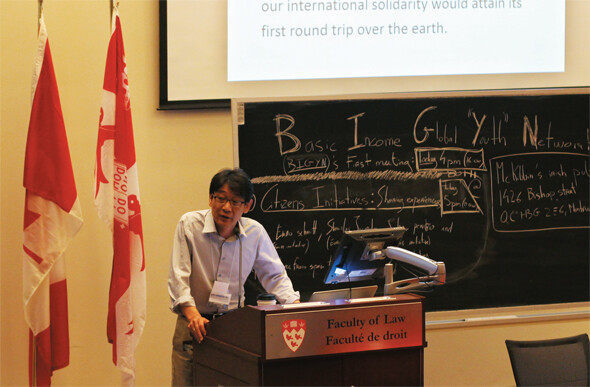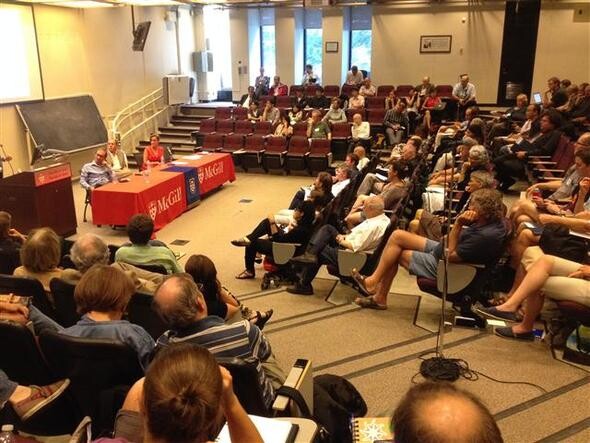hankyoreh
Links to other country sites 다른 나라 사이트 링크
[Special report] Basic income movement gaining momentum worldwide

By Ahn Hyo-sang, director of the Basic Income Korean Network
The 15th Congress of the Basic Income Earth Network (BIEN), a solidarity organization of activists around the world who are part of the basic income movement, took place at McGill University in Montreal, Canada, from June 27 to 29. The BIEN Congress is held once every two years. At this year’s event, South Korea was selected as the site of the 16th Bien Congress, which will take place in 2016, two years from now. This is a first for an Asian country.Ahn Hyo-sang, a director of the Basic Income Korean Network who participated in the congress as part of a delegation promoting Korea as the site for the next congress, sent the Hankyoreh 21 a report of his experience.
The idea of basic income, or giving money to each member of society with no strings attached, is no longer such an unfamiliar concept in South Korea. Partly, this is because basic income is necessary for creating a paradigm that can overcome the ecological crisis and the crisis of neoliberalism. But it is also the result of the dedication and effort shown by the supporters of basic income.
The international organization that joins together supporters of basic income from around the world, the Basic Income Earth Network (BIEN), holds its general assembly every two years. The 16th BIEN Congress took place at McGill University in Montreal, Canada, from June 27 to 29.
Under the slogan of re-democratizing the economyMore than 100 people took part in this year’s Congress, which was held under the slogan of “Re-Democratizing the Economy.” The Congress included presentations and debates on a variety of themes, including financial support for basic income, a legal guarantee for basic income, basic income and democracy, basic income and economic participation, basic income and employment, basic income and immigration, and gendered perspectives on basic income. In addition, special sessions discussing basic income were held separately in South Korea, Japan, and North America.
The phrase “re-democratizing the economy” refers to reversing the atrophy of the welfare state, which was created amid the recognition and expansion of social rights following World War II and is now threatened by the trend of neo-liberalism. What it does not mean, however, is regressing to the welfare state of the past or rebuilding the welfare state. In fact, it would be impossible to recreate in today’s world the welfare state that emerged against a backdrop of an economic boom, mass consumption, total employment, and robust labor unions.
In addition, the welfare state has its own problems, including its dispensational nature and bureaucratic management. Not only that, but it is absurd to speak of “re-democratizing” the countries in the southern hemisphere, which have experienced neither the welfare state nor a democratized economy.
Given this situation, the event that attracted particular attention at this Congress was a round table discussion titled “Piloting Basic Income in India: Towards Transformation?” with presentations by Renana Jhabvala, president of India’s Self-Employed Women’s Association (SEWA) and Professor Guy Standing, who is known for his book “The Precariat: The New Dangerous Class.”
Funded by UNICEF, Standing worked with SEWA to carry out an experiment in basic income in nine villages in the Indian state of Madhya Pradesh from 2010 to 2013. The object of the experiment was to observe the effect of giving a certain amount of money each month to 6,000 people, including men, women and children. In the experiment, adults received 200-300 rupees (US$3.34-$5.01) and children received 100-150 rupees (US$1.67-$2.50) a month.
The result of the pilot program, Standing and Jhabvala said, was overall improvement in the nutrition and health of the residents of these villages. The study found that school attendance rates increased, academic performance improved, economic activity grew, debt shrank, and savings went up. The disabled in particular benefited by the program.
The important thing here is the increase in economic activity, which supports the argument that cash payments make individuals more active and independent. This can be viewed as the difference between basic income and traditional programs to eliminate poverty.

If the Indian case was a kind of experiment, the Swiss basic income initiative and the European citizens’ initiative are movements that are currently underway to make basic income a reality. Presentations on this topic were made by Enno Schmidt and Stanislas Jourdan during a roundtable discussion on the theme called “Basic Income on the Agenda: What Role for Citizen Initiatives?”
Schmidt is a Swiss basic income activist who is also famous for directing the documentary “Basic Income, a Cultural Impulse.” Jourdan is a French journalist and activist who is playing a key role in the European citizens’ initiative for basic income.
As is already well-known, 126,000 Swiss people signed a basic income initiative in Oct. 2013, which means that the issue will be put to a national referendum before long. The European citizens’ initiative for basic income, which began in Apr. 2012, takes the form of a proposal to the executive committee of the European Union. It is essentially a petition that puts pressure on member countries to draft legislation.
Schmidt refers to basic income as a new vision for a new age, freeing people from the burden of supporting themselves and allowing each of them to do what they want to do. For this reason, a basic income can also be seen as a kind of human right. Even if the Swiss national referendum does not pass, it could still be successful regardless of the results in the sense that it puts the issue of basic income on the public agenda, observers say.
The same is true of the European citizens’ initiative for basic income. The petition drive came to an end in January, collecting 285,000 signatures from across Europe. While this fell far short of the original goal of 1 million signatures, the issue was heavily covered by the media while signatures were being collected and also managed to bring in existing organizations such as labor unions. As a result, the initiative can be regarded as a success in the sense that it increased interest in basic income, Jourdan said.
This year’s Congress was particularly significant in terms of the South Korean basic income movement. The final event of the Congress was the General Assembly, which elects executives and determines the site of the next Congress. The question of where the next Congress is to be held was of great interest to participants at the Congress in Montreal. While the site of the next Congress had been chosen without any competition at the 14 previous Congresses, this year, South Korea, Finland, and the Netherlands all applied to host the next event.
The three countries all had their own reasons for applying to host the next Congress. Finland, a welfare state in Northern Europe, wanted to make clear that basic income is a new paradigm that goes beyond the existing welfare state. The Netherlands wanted to host the Congress in order to help promote the basic income movement at home in the context of the European citizens’ initiative.
Finally, South Korea made a strong case that hosting the event would be an opportunity not only to increase popular interest in basic income but also to create a new left-wing politics. In addition, the South Korean delgegation focused on the fact that this would be the first time the BIEN Congress would be held in Asia.
Seoul, the site of the next BIEN CongressWhile there was some discussion of pros and cons, the South Korean delegation was the best prepared. In the end, the representatives from the Netherlands and Finland yielded on the issue, acknowledging the South Korean delegation’s passion to expand the basic income movement, and Seoul was chosen as the host city for the next BIEN Congress. This creates an opportunity for the South Korean basic income movement to gain new momentum. Historically, international solidarity movements have always experienced progress and expansion through such congresses, with the host of the congress both providing support for the event and using the event to gain new vitality.
South Korean supporters of the basic income movement regard basic income as a major mechanism for social and ecological transformation, and they are assiduously working to create the theoretical and political basis for achieving this. The 2016 Seoul BIEN Congress will be both an opportunity to affirm these efforts and a turning point to increase public awareness of basic income.
Please direct questions or comments to [english@hani.co.kr]

Editorial・opinion
![[Editorial] Does Yoon think the Korean public is wrong? [Editorial] Does Yoon think the Korean public is wrong?](https://flexible.img.hani.co.kr/flexible/normal/500/300/imgdb/original/2024/0417/8517133419684774.jpg) [Editorial] Does Yoon think the Korean public is wrong?
[Editorial] Does Yoon think the Korean public is wrong?![[Editorial] As it bolsters its alliance with US, Japan must be accountable for past [Editorial] As it bolsters its alliance with US, Japan must be accountable for past](https://flexible.img.hani.co.kr/flexible/normal/500/300/imgdb/original/2024/0417/6817133413968321.jpg) [Editorial] As it bolsters its alliance with US, Japan must be accountable for past
[Editorial] As it bolsters its alliance with US, Japan must be accountable for past- [Guest essay] Amending the Constitution is Yoon’s key to leaving office in public’s good graces
- [Editorial] 10 years on, lessons of Sewol tragedy must never be forgotten
- [Column] A death blow to Korea’s prosecutor politics
- [Correspondent’s column] The US and the end of Japanese pacifism
- [Guest essay] How Korea turned its trainee doctors into monsters
- [Guest essay] As someone who helped forge Seoul-Moscow ties, their status today troubles me
- [Editorial] Koreans sent a loud and clear message to Yoon
- [Column] In Korea’s midterm elections, it’s time for accountability
Most viewed articles
- 1[Column] The clock is ticking for Korea’s first lady
- 2Samsung barricades office as unionized workers strike for better conditions
- 3[Editorial] When the choice is kids or career, Korea will never overcome birth rate woes
- 4[News analysis] After elections, prosecutorial reform will likely make legislative agenda
- 5S. Korea, Japan reaffirm commitment to strengthening trilateral ties with US
- 6Japan officially says compensation of Korean forced laborers isn’t its responsibility
- 7Why Israel isn’t hitting Iran with immediate retaliation
- 8[Editorial] Does Yoon think the Korean public is wrong?
- 9[Guest essay] How Korea turned its trainee doctors into monsters
- 10[Guest essay] Amending the Constitution is Yoon’s key to leaving office in public’s good graces